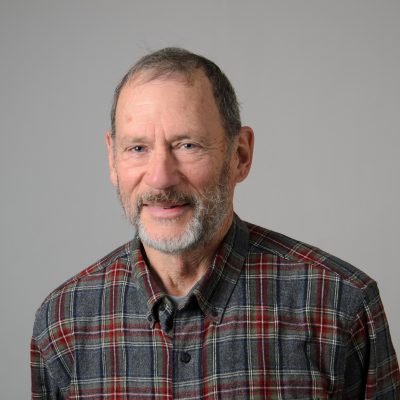The recent retirement of Professor of Molecular and Cell Biology David Knecht might suggest the end of an era in MCB.  David joined our department in 1987 after undergraduate studies and a major in chemistry at Oberlin College, doctoral work in cell biology at the University of Wisconsin/Madison, and postdoctoral work on the molecular and cell biology of development at the University of California/San Diego. He has been an active and extremely vocal member of the department for the entirety of the ensuing 35 years. During that time, he made seminal contributions to both the immediate departmental environment, the University at large and the wider scientific community. He has provided a constant source of expertise in microscopy, molecular biology and developmental biology, has served as Co-head of the Flow Cytometry and Confocal microscopy Facilities in the Biotechnology Center, headed the Cell and Developmental Biology Area of concentration, and led the departmental Courses and Curriculum Committee, to name but a few of his contributions. His scholarly productivity has been quite high, with significant grant support over the decades from NIH, ACS, and NSF, and his work has resulted in nearly 100 scientific publications and a patent. David’s overall role in the UCONN scientific community was recognized in 2019 with the UConn CLAS Faculty Research Excellence Award in the Life and Behavioral Sciences. Despite his well-known penchant for asking the “hard questions”, David has been a sought-after mentor and graduate committee member, both for his own research in the molecular mechanisms of cell motility, and for his legendary expertise in many different forms of high-end microscopy. This role as mentor has been recognized by the University with the 2022 Marth Award, which celebrates a faculty member for outstanding leadership and dedication to excellence in mentoring graduate students.
David joined our department in 1987 after undergraduate studies and a major in chemistry at Oberlin College, doctoral work in cell biology at the University of Wisconsin/Madison, and postdoctoral work on the molecular and cell biology of development at the University of California/San Diego. He has been an active and extremely vocal member of the department for the entirety of the ensuing 35 years. During that time, he made seminal contributions to both the immediate departmental environment, the University at large and the wider scientific community. He has provided a constant source of expertise in microscopy, molecular biology and developmental biology, has served as Co-head of the Flow Cytometry and Confocal microscopy Facilities in the Biotechnology Center, headed the Cell and Developmental Biology Area of concentration, and led the departmental Courses and Curriculum Committee, to name but a few of his contributions. His scholarly productivity has been quite high, with significant grant support over the decades from NIH, ACS, and NSF, and his work has resulted in nearly 100 scientific publications and a patent. David’s overall role in the UCONN scientific community was recognized in 2019 with the UConn CLAS Faculty Research Excellence Award in the Life and Behavioral Sciences. Despite his well-known penchant for asking the “hard questions”, David has been a sought-after mentor and graduate committee member, both for his own research in the molecular mechanisms of cell motility, and for his legendary expertise in many different forms of high-end microscopy. This role as mentor has been recognized by the University with the 2022 Marth Award, which celebrates a faculty member for outstanding leadership and dedication to excellence in mentoring graduate students.
As an invaluable colleague and collaborator who was always willing to share his expertise, engage in vigorous debate on the relative merits of a scientific approach, the interpretation of novel data, or just about anything else, he will be missed in the everyday rush of MCB activities. But he no doubt will be equally busy as he steps into his new role as Rear Commodore for Racing at the Thames Yacht Club, and we expect that he will continue the tradition of excellence and community that he has fostered within MCB.